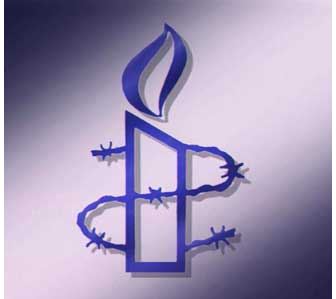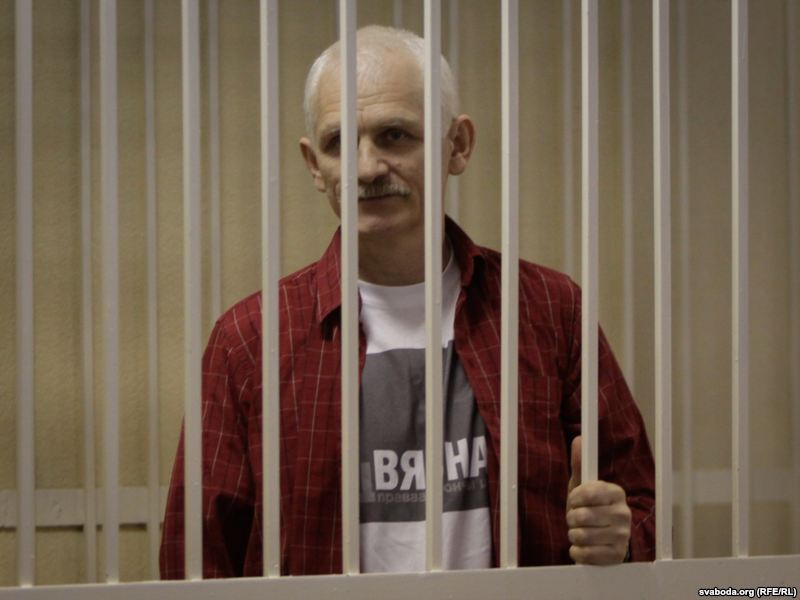Ales Bialiatski is accused of tax evasion on especially large scale as the prosecutor considers the funds that were directed to the human rights activities as Bialiatski’s income. Lithuania and Poland were the ones who transferred Bialiatski’s account data to official Minsk. Human rights organization “Amnesty International” recognized Bialiatski as a prisoner of conscience. He now faces up to seven years of imprisonment with confiscation of property.
Day One
The trial began on 2 November. From early morning extraordinary precautionary measures were taken by the authorities in order to secure the courthouse: the SWAT squads and several traffic police cars arrived, parking places for private vehicles were cordoned off with the protective tape. Reporters without editorial ID’s were not allowed in the courtroom. Leaders of civic movements and political parties, representatives of foreign diplomatic missions attended the trial. The judge denied the defence motions to conduct the process in Belarusian language and to change the preventive measure for Ales Bialiatski.
Day Two
On 3 November, witnesses conducted their appearances. The testimony of Natallia Pashkouskaya, the head of the inspection council of system for international payments SWIFT of National Bank of Belarus, turned out to be a real sensation of the day. Pashkouskaya examined the printouts of the bank accounts sent from Lithuania and Poland, and stated that formally they do not comply with international standards, but standards of a particular banks only. Pashkouskaya also stated that according to existing regulations, bank statements must be officially certified. “If they are not sealed, then, in my opinion, these documents cannot be regarded as valid,” – said Pashkouskaya.
Human rights defender Barys Zvoskau  (right) brought a reference from the Polish bank PKO to the court, which stated that he does not possess an account in that bank, as opposed to what he was accused of during the preliminary investigation. The prosecutor expressed his regret acknowledging that the documents concerning Zvoskau contain errors and inconsistencies. Zvoskau replied to that: “What kind of evidence do you have? Is the rest of your evidence of same quality? “
(right) brought a reference from the Polish bank PKO to the court, which stated that he does not possess an account in that bank, as opposed to what he was accused of during the preliminary investigation. The prosecutor expressed his regret acknowledging that the documents concerning Zvoskau contain errors and inconsistencies. Zvoskau replied to that: “What kind of evidence do you have? Is the rest of your evidence of same quality? “
In general colleagues of Bialiatski held a joint position, admitting that they received money from Bialiatski “for human rights activities.” But they refused to give any information about amounts, accounts and other details, invoking article 27 of the Constitution, which allows one not to testify against himself.
 Alexandra Kulayeva (left), the member of the International Federation for Human Rights(Ales Bialiatski is Vice-president of FIDH), follows the trial in Pershamayski court, and the process she saw only confirms her belief that this is a political trial aimed to stop activities of Mr. Bialiatski:
Alexandra Kulayeva (left), the member of the International Federation for Human Rights(Ales Bialiatski is Vice-president of FIDH), follows the trial in Pershamayski court, and the process she saw only confirms her belief that this is a political trial aimed to stop activities of Mr. Bialiatski:
“There have been attempts to make a psychological pressure on both the accused and witnesses. The latter were asked questions that concerned them and their activities, rather than the case. I also think that the answers of witnesses showed that the investigation was carried out very poorly, there were errors and inconsistencies in the documents. On the whole, it seems as a quite rudely trumped-up, poorly prepared political show, which aims to discredit prominent human rights defender. “
Information from Lithuanian banks can not be used as evidence
Information on accounts of Ales Bialiatski transferred by Lithuania cannot serve as evidence in court stated the Ministry of Justice of Lithuania.
“A couple of months ago we officially informed the authorities of Belarus, that we cancel the data sent by the Ministry of Justice of Lithuania on the basis of an agreement on legal assistance, and that this information cannot be used as legal evidence in court,” – said in a statement of the Minister of Justice of Lithuania Remigijus Šimašius.
According to the statement “Legal agreements and a system of international cooperation are aimed at the exposure of the terrorists and tracking criminals, as well as providing greater security and can not be used for political purposes”
Lithuania and Poland stated that the Belarusian authorities, in this case allowed the abuse of legal aid scheme.
Amnesty International calls for release of Bialiatski International human rights organisation Amnesty International stated that the Belarusian authorities should release the “prominent human rights defender whose arrest on charges of serious tax evasion is believed to be politically motivated.”
International human rights organisation Amnesty International stated that the Belarusian authorities should release the “prominent human rights defender whose arrest on charges of serious tax evasion is believed to be politically motivated.”
“Ales Bialiatski was imprisoned during a wave of brutal persecution of human rights defenders and activists in Belarus. The Belarusian authorities have the right to punish for tax evasion, but these charges are clearly politically motivated and were brought against, simply to stop his human rights activities, “- said John Dalhuisen, Europe and Central Asia Deputy Programme Director of Amnesty International.
“By refusing to register the NGO and thereby not allowing them to operate openly, the government of Belarus makes activists such as Ales Bialiatski to use bank accounts in neighbouring countries in order to finance their activities. He should be released immediately and unconditionally “- added Dalhuisen.
Related articles
Belarus closes borders before the trial (updated)
Human Right House Foundation against the persecution of Bialiatski





